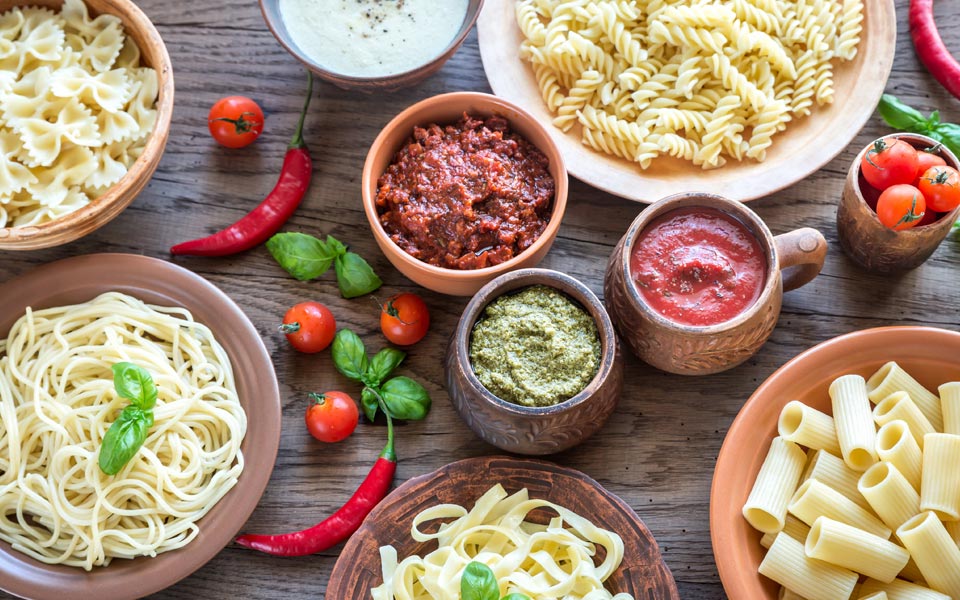October is National Pasta Month. Use these tips for pasta and sauce pairings to celebrate this classic comfort food all month.
By Vicki Martinez


Pasta is one of the most versatile and delicious foods around. Not only are there almost 350 different types, but the dishes you can create using various combinations of ingredients — fresh produce, lean dairy and meats, and sauces — are practically endless.
Did you know there’s a way you can add that extra touch, taking a pasta dinner to a new level of delicious perfection? All it takes is a little culinary know-how on pairing the different cuts of pasta with the right sauce.
Use this simple guide to make the most out of the delicious possibilities.

When you hear the words “angel hair” what comes to mind?” Delicate? Airy? Light? Heavenly? Divine? Those are the exact qualities to look for in a sauce when your pasta dish calls for long, slender pasta shapes.
Pasta Type: angel hair
Pesto and olive oil-based sauces pair perfectly with spaghetti, vermicelli, linguine, and (of course) angel hair pasta. Lighter, more delicate sauces keep strands from clumping and sticking (something they tend to do because of the length).


Pesto, olive oil-based sauces
In Italian, capelli d’angelo means angel’s hair.

Pasta Type: angel hair
When you hear the words “angel hair” what comes to mind?” Delicate? Airy? Light? Heavenly? Divine? Those are the exact qualities to look for in a sauce when your pasta dish calls for long, slender pasta shapes.
Pesto and olive oil-based sauces pair perfectly with spaghetti, vermicelli, linguine, and (of course) angel hair pasta. Lighter, more delicate sauces keep strands from clumping and sticking (something they tend to do because of the length).

FUN FACT
Pesto, olive oil-based sauces
SAUCE PAIRING

RECIPE
In Italian, capelli d’angelo means angel’s hair.

Pasta like penne, rigatoni, ziti or mostaccioli is flat- or diagonal-cut tubes making them the perfect vehicle for a chunky sauce. The thicker wall stands up to hearty sauces while the hollow center fills with each flavorful ingredient, offering a bit of everything in each bite.
Pasta Type: RIGATONI, ZITI, mostaccioli
FUN FACT: Rigatoni, which is both tubular and ridged, is traditionally used in Italy with Bolognese sauce, unlike the more Americanized version which uses tagliatelle.

Thick sauces, like Bolognese
Rigatoni’s ends are cut square (perpendicular) to the tube walls instead of diagonally


Pasta Type: RIGATONI, ZITI, mostaccioli
Pasta like penne, rigatoni, ziti or mostaccioli is flat- or diagonal-cut tubes making them the perfect vehicle for a chunky sauce. The thicker wall stands up to hearty sauces while the hollow center fills with each flavorful ingredient, offering a bit of everything in each bite.
FUN FACT: Rigatoni, which is both tubular and ridged, is traditionally used in Italy with Bolognese sauce, unlike the more Americanized version which uses tagliatelle.

FUN FACT
Thick sauces, like Bolognese
SAUCE PAIRING

RECIPE
Rigatoni’s ends are cut square (perpendicular) to the tube walls instead of diagonally

Flat, ribbon-like pasta -- think fettuccine, pappardelle, tagliatelle -- make the perfect match for sauces that are rich and creamy in texture. These flatter noodles soak up the pasta sauce. This type of cut also keeps cream-based sauces smooth, rather than clumping up as they often do.
Pasta Type: fettuccine, pappardelle, tagliatelle
TOP TIP: The secret to perfectly pairing pasta with sauce is a two-step process. First, always undercook your pasta just a little bit. Why? Because you're going to finish cooking the pasta by adding your sauce to the pan. As your pasta finishes cooking to the perfect al dente texture it simultaneously absorbs the flavors from the sauce.

Rich, cream-based sauces
Italians never use a spoon and a fork when eating spaghetti. This is an American habit

Step two involves reserving a quarter cup of the pasta water (or more if you prefer). As you finish off the pasta, add your reserved cooking water to the sauce. It not only adds additional flavor to your sauce, but the starch released from the boiling pasta causes sauces to adhere better to the pasta.

Pasta Type: fettuccine, pappardelle, tagliatelle
Flat, ribbon-like pasta -- think fettuccine, pappardelle, tagliatelle -- make the perfect match for sauces that are rich and creamy in texture. These flatter noodles soak up the pasta sauce. This type of cut also keeps cream-based sauces smooth, rather than clumping up as they often do.
TOP TIP: The secret to perfectly pairing pasta with sauce is a two-step process. First, always undercook your pasta just a little bit. Why? Because you're going to finish cooking the pasta by adding your sauce to the pan. As your pasta finishes cooking to the perfect al dente texture it simultaneously absorbs the flavors from the sauce.

FUN FACT
Rich, cream-based sauces
SAUCE PAIRING

RECIPE
Italians never use a spoon and a fork when eating spaghetti. This is an American habit
Step two involves reserving a quarter cup of the pasta water (or more if you prefer). As you finish off the pasta, add your reserved cooking water to the sauce. It not only adds additional flavor to your sauce, but the starch released from the boiling pasta causes sauces to adhere better to the pasta.
Regional Italian Cuisine
These tips are courtesy of Chef Lorenzo Boni, executive chef Barilla American pasta. Make sure to check out our interview with Chef Lorenzo to learn more about great Italian cooking.
Mangiamo – let’s eat!








